|
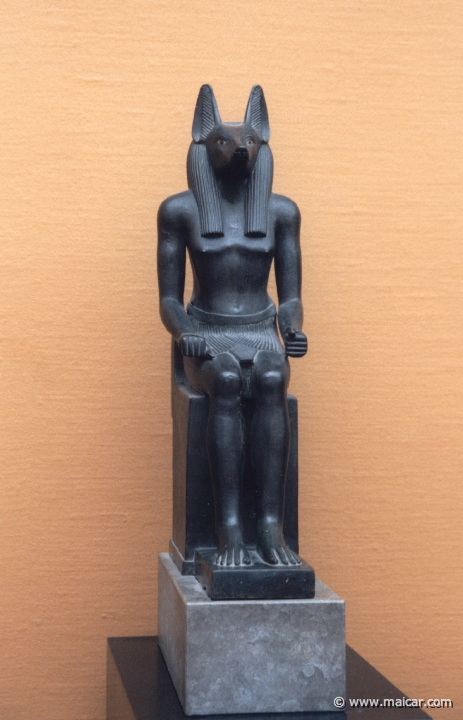
|
5032: The god Anubis, c. 600 BC. Ny Carlsberg Glyptotek, Copenhagen.
|
|
Anubis. Egyptian dog-headed god. Ov.Met.9.690.
Ceto 1. Sea deity. Apd.1.2.6; Hes.The.238, 297, 333; Hyg.Fab.Pre.
Conisalus. Attic deity resembling Priapus (phallic deity). Strab.13.1.13.
Consus. God of counsel (for "consilium" is still the
word for counsel. During a ceremony offered to this
god, Romulus gave the
signal for the abduction of the Sabine women. Plu.Rom.14.3.
|
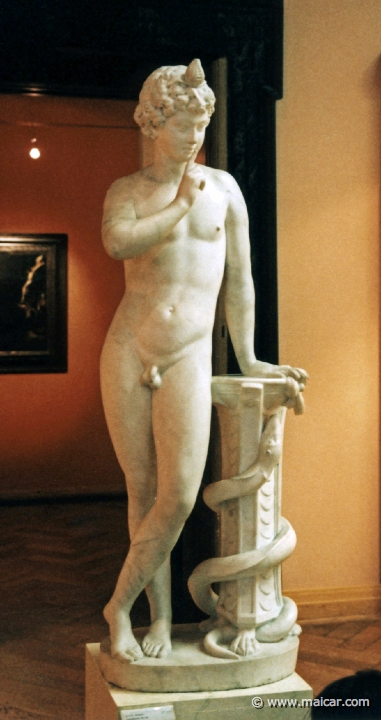
|
Harpocrates, god of Silence, enjoining it with his finger on his lips. 0422: Harpocrates. Statue by Wilhelm Beyer, 1725-1796. Gemäldegalerie der Akademie der bildende Künste, Wien.
|
|
DIOSCURI. Immortal twins. The twin brothers Polydeuces and Castor 1. As Polydeuces refused his immortality while Castor 1 was dead, Zeus permitted them both to
be every other day among the gods and among
mortals.
Egeria. Italian goddess. Took care of Hippolytus 4, son of Theseus, after he was raised from the dead, until he changed his name and became Virbius. She used to visit Numa 3 and instruct him in the art of reigning. DH.2.60.5; Ov.Fast.3.275; Plu.Num.4.2;
Vir.Aen.7.775;
Enyo 2. Goddess of warfare. Sacker of cities, sister of
War. When Troy was being taken Enyo 2, revelling in the drunkenness of unmixed blood, danced all night throughout the city, like a hurricane. Aes.Sev.45; Col.144, 153; Hom.Il.5.333, 5.592; Nonn.2.419, 2.475, 2.532, 7.30, 17.15, 17.376; QS.5.29, 8.425, 8.186; Stat.Theb.8.656; Strab.12.2.3-5; Try.559.
Eurybia 1. Divinity with a heart of flint. Offspring of
Pontus & Gaia. Apd.1.2.2-6; Hes.The.239, 375.
Harpocrates. The god of silence, worshipped by the Egyptians.
One of the gods in the vision of Telethusa; the one
who enjoins silence with his finger on his lips.
Son of Isis. Hyg.Fab.277; Ov.Met.9.692.
Hora 1. Roman goddess. Hersilia's name after she became
a goddess. The only one of the Sabine women who was
already married. Went up with a star to heaven
where she was received by her husband Romulus and made
immortal. DH.2.45.2; Ov.Met.14.830, 14.850; Plu.Rom.14.6-7.
Hymenaeus 1. God of Marriage, always attending the wedding
rites. He is the playfellow of Eros. Son of Urania 2 (one of the MUSES). Eur.Tro.310; Nonn.24.87, 33.67; Ov.Met.9.762;
QS.14.297.
|
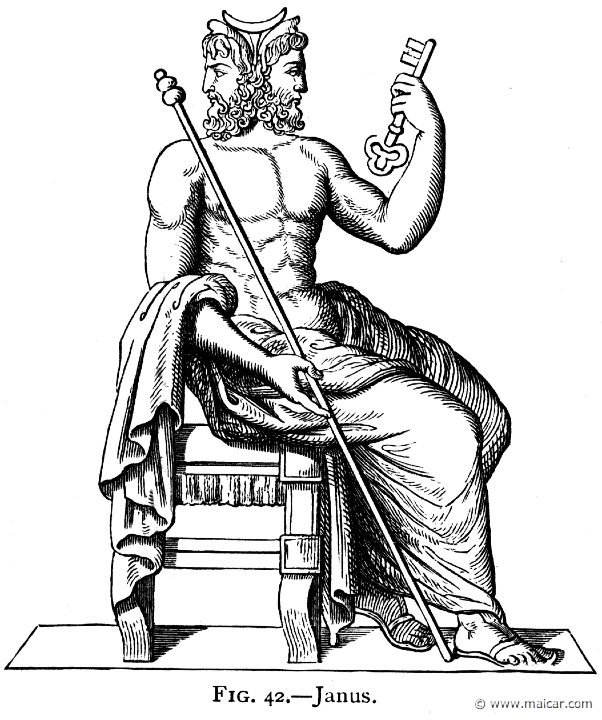
|
mur042: Janus. Alexander S. Murray, Manual of Mythology (1898).
|
|
Iaso. Goddess of healing. Pau.1.34.3.
Ilithyia. Goddess of childbirth. Ilithyia sends the pangs
which seize a woman in childbirth, and provides the
alleviation of the travail of childbirth. She is
called daughter of Zeus & Hera, born near
Cnossos in Crete, but
others say that she was one of the Hyperboereans, a
people living in the far north. And still others
have called her "the clever spinner", indentifying
her with fate and considering her even older than Cronos. Ilithyia, who is
also called the mother of Love, is known for having
helped Leto in her labor when she gave birth to her sweet children Apollo and Artemis, and for having
been persuaded by Hera to
retard Alcmena's
delivery when she was about to gave birth to Heracles 1. Artists
have represented Ilithyia holding a torch, which
has been thought to be her attribute because the
pangs of women are like fire. But the torch has
also be explained by the fact that it is Ilithyia
who brings children to the light. Apd.1.3.1; Dio.5.73.4; Hes.The.922; Hom.Apo.3.97; Hom.Il.11.270; Nonn.25.41;
Ov.Fast.2.449; Pau.8.32.4, 9.27.2; Pin.Pyth.3.9.
Isis (see Io). Egyptian goddess.
|
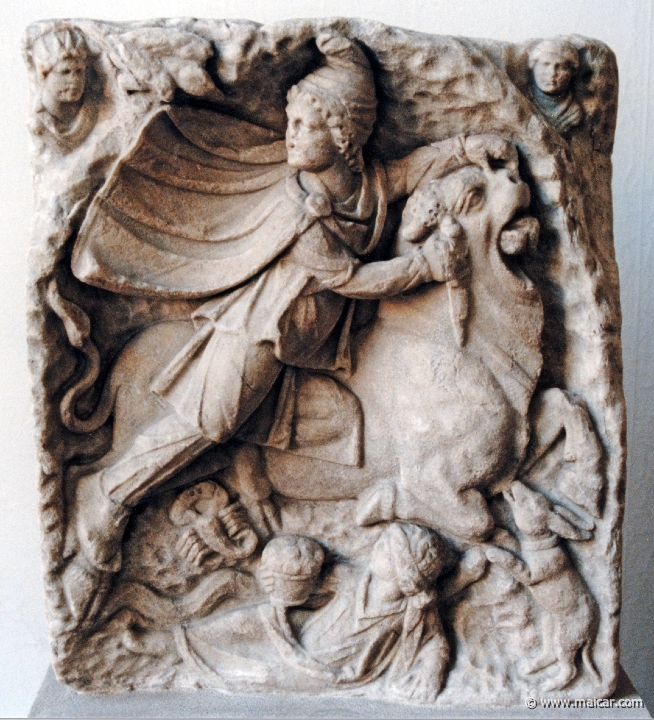
|
2136: Mithras, 2 Jhr. n. Chr. Pergamon Museum, Berlin.
|
|
Janus. Janus is a Roman two-headed god, the opener of
the year and the patron of civil and social order.
He is sometimes called Chaos by the ancients for
being a deity of old. Greece had no divinity like
him and he is the only one among the gods who
beholds his back, being the porter of the heavenly
court and seeing at once both East and West. He
sits with the HORAE at
heaven's gate and regulates the comings and the
goings. Like Hecate's faces turned in three directions guard the crossroads when they divide in three different ways, so do Janus, who do not lose time twisting his neck. Father, by the Nymph Venilia, of the gifted singer Canens. Ov.Fast.1.65ff, 1.104, 1.125, 5.424, 6.107ff.;
Ov.Met.14.320ff.; Plu.Num.19.6; Vir.Aen.7.180,
12.198.
Juturna. Daughter of King Daunus of Apulia (southern
Italy) and Venilia (counted among the NYMPHS). It is said that
Juturna became a goddess of lakes and rivers in
return for the maidenhood Zeus ravished. Vir.Aen.10.76, 10.616, 12.138ff., 12.879.
LARES. (Italian) twin brothers, who guard the
crossroads and ever keep watch in the city.
Children of Hermes &
Lara (Lara is Tacita; see below). Ov.Fast.2.616, 5.129ff.
Metis 1. One of the OCEANIDS,
daughter of Oceanus & Tethys. She turned into many shapes to avoid Zeus' embraces but she
became his first wife. Gaia had said that, after giving birth to the maiden who was in her womb, Metis 1 would bear a son who would be the lord of heaven. From fear of that Zeus swallowed her. And
when the time came for the birth to take place, Prometheus 1 or else Hephaestus smote the
head of Zeus with an axe,
and Athena, fully armed,
leapt up from the top of his head at the river
Triton. Apd.1.2.2, 1.3.6; Hes.The.886ff., 358.
Mithras. Mithras is the Sun of Babylon; in Hellas Delphic Apollo. Nonn.40.400; Stat.Theb.1.720.
|
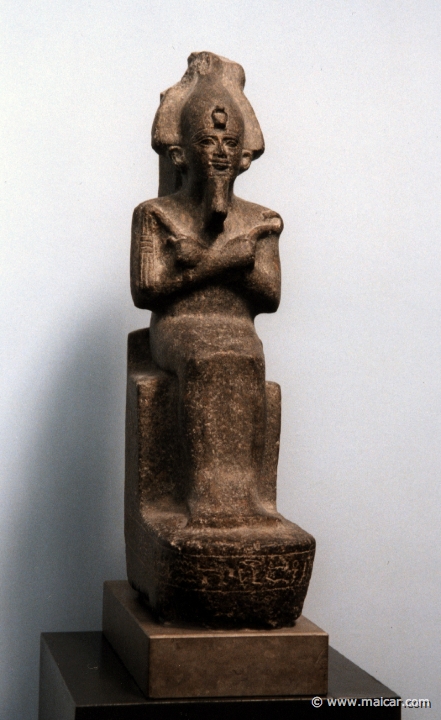
|
5033: The god Osiris, c. 740 BC. Ny Carlsberg Glyptotek, Copenhagen.
|
|
Modius. Italian divinity. Son of a maiden of highest
birth and a divinity. Founder of the city of Cures,
from which the Sabines came. DH.2.48.3.
Morpheus God of dreams. Represents the features and the
speech of men in dreams. Son of Hypnos. Ov.Met.11.635.
Natio. Goddess of childbirth. Was believed to watch over married women in travail (see also Ilithyia). Cic.ND.3.47.
Orthanes. Phallic deity. Strab.13.1.13.
Osiris 1. A god worshipped by the Egyptians, and on his
death mourned by Isis. One of
the gods in the vision of Telethusa. Ov.Met.9.693; Pau.10.32.18; Stat.Theb.1.718.
Paeeon. Universal healer. Was in Heaven, knew the
remedies for all things and healed the wound that Ares had received during
the fight against Athena and Diomedes 2. Arg.4.1508ff.; Hes.Fra.2; Hom.Il.5.899.
PENATES. Household gods of the Romans, taken to Italy
from Troy by Aeneas. When Alba was
built, these gods were removed from Lavinium and
taken to the new city, but during the night they
returned by themselves to Lavinium. They were the
gods of the race, of the family, of house and
property, of the inner house, and of the front
court. They were represented as two youths holding
spears. Cic.ND.2.68; DH.1.67.1ff., 1.68.2.
Phobetor. God of dreams. He takes the form of beast or
bird or serpent in men's dreams. Son of Hypnos. Ov.Met.11.640.
Phorcus Sea deity. Apd.1.2.6; Arg.4.828ff.; Hes.The.237, 297,
333ff.; Hom.Od.1.71; Pla.Tim.40e.
Picus. A demigod, son of Cronos, living on the
Aventine hill. Kind of divinity that might be
likened to the SATYRS or
PANS. He is said to have used powerful drugs and
practised clever incantations and to have traversed
Italy playing the same tricks as the Idaean DACTYLS. Circe loved him, and being refused, transformed him into a bird (a woodpecker). Picus is father (by Canens) of Faunus 1. Ov.Met.14.320ff.; Plu.Num.15.3; Vir.Aen.7.48,
7.187.
Priapus Phallic deity.
Quirinus. The name Romulus received when he became a god. Cic.ND.2.62; DH.2.63.3; Ov.Fast.2.475;
Ov.Met.14.829ff.
Sancus Sabine divinity. Father of Sabus from whom the
Sabine race received its name (but it is also said
that the eponym of the Sabines was Sabinus). DH.2.49.2.
|
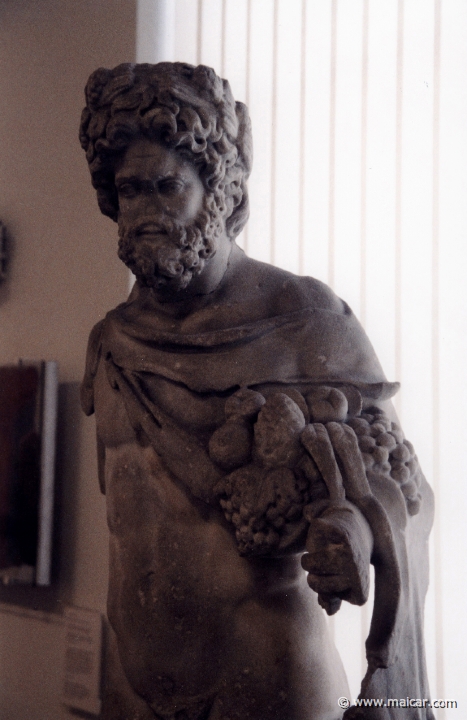
|
5626: Silvain (Silvanus). Provenance: Campanie. Vers 140 après J.-C. Marbre d'Usak. Musée d'Art et d'Histoire, Genève.
|
|
Silvanus Roman god of fields and cattle. Ov.Met.14.639; Stat.Theb.4.111; Vir.Aen.8.602;
Vir.Geo.2.493.
Thaumas 1 Son of Pontus & Gaia. Father of the HARPIES, Hydaspes 1 and Iris 1. Apd.1.2.6; Hes.The.237, 266; Hyg.Fab.14;
Nonn.26.362.
Tacita (Lara). Goddess of silence. The Silent Goddess (Dea
Muta). Also called a Muse, the silent or speechless
one. Originally she was a Naiad Nymph who could not
hold her tongue and reported to Hera that Zeus loved Juturna. For
this Zeus wrenched from her
the indiscreet tongue, and told Hermes to take her to Hades as she was to
become an infernal Nymph. Ov.Fast.2.572; Plu.Num.8.6.
Taraxippus. A deity ("Frightener of Horses"), who frightened
the horses during the race-courses at Olympia. On one side of
the race-course there was a round altar and, on
passing it, the horses were seized with fear,
causing the chariots to crash and the charioteers
to be injured. For this reason the charioteers
offered sacrifices to Taraxippus before the race. The altar or mound was sometimes believed to be
the grave of an original inhabitant who was skilled
in horsemanship. Others said that here was buried
Dameon and his horse, who took part in the
expedition of Heracles 1 against King Augeas of Elis and was killed by
Cteatus. Still others have believed that this was
an empty mound made by Pelops 1 to honour
Myrtilus; for thanks to his trick the horses of
King Oenomaus 1 of
Pisa were frightened and Pelops 1 won the race, thus obtaining the hand of Hippodamia 3, the king's daughter. For this reason some thought that it was Oenomaus 1 himself who frightened the horses. Yet others have said that here was buried Alcathous 1 (one of the SUITORS OF HIPPODAMIA 3) who, after being unsuccessful on the course, was killed by the bride's father becoming hostile, after death, to chariot-drivers. It has also been said that Pelops 1 had received something (what, they don't say)
from Amphion 1, and
that he buried it in Taraxippus' place, being that
something what frightened the horses of Oenomaus 1 and those
of all charioteers ever since. There was another
Taraxippus at the Isthmus of Corinth, which was said to be Glaucus 1 (son of Sisyphus), who was
killed by his horses during the contest that
Acastus held in honor of his father Pelias 1, king of
Iolcus. Pau.6.20.15ff.
Terminus. God of boundaries (Terminus = boundary),
guardian of peace and a witness of just dealing. Plu.Num.16.1. THRIAE. Three sisters, virgin and winged, who were
teachers in divination and were inspired through
eating honey. Hom.Herm.4.554ff. Tychon Phallic divinity. Strab.13.1.13. |